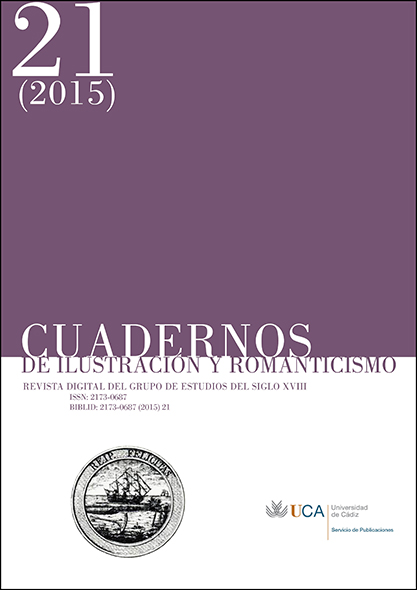Letters and compilations in Eighteenth-Century Literary Criticism: breaking away from «vain erudition»

DOI
https://doi.org/10.25267/Cuad_Ilus_Romant.2015.i21.03Info
Abstract
Ever since Gregorio Mayans y Siscar gathered letters written by renowned
epistolographers in his five-volume Cartas morales, militares, civiles y literarias (1733), letter exchanges with educated people and with people who hold powerful positions in society increased dramatically in the eighteenth century. The act of compiling such epistolary works indicates a formal cohesion in design and an awareness of the critical legacy of the literary letters that stand in contrast with their fragmentation and brevity. Writers show a growing preference to express opinions through brief letter forms by detaching themselves from erudite forms of writing and suggesting that their letters do not need to be part of collections such as Mayans’s and to stuff private libraries in order to have full meaning. The literary letters discussed in this essay avoid erudite verbiage and negotiate a new status for themselves through modern forms of critique that appeal to a different type of reader. In opposition to Costantini’s concept of «vain erudition», literary letters aim to develop a capacity for critical reading among its readership. This essay explores select collections of literary letters designed to sharpen the critical skills of their readers while tackling the disproportionate taste of collectors and focusing on an individual’s right to an opinion. This renovation in literary taste could not have been fully implemented without the important role of letters in an emerging, modern form of literary criticism.
Keywords
Downloads
How to Cite
License

This work is licensed under a Creative Commons Attribution-NonCommercial-NoDerivatives 4.0 International License.
The papers published in this journal are the property of Cuadernos de Ilustración y Romanticismo: the source must be cited whenever they are used.
The authors retain the copyright © and grant the journal the right to publish. They may host their work in the final published version on personal websites or websites intended for scientific dissemination, provided that they indicate the source.






